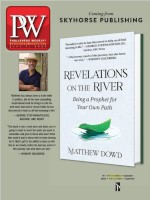In Kleeman’s Something New Under the Sun (Hogarth, Aug.), a writer assists with the film adaptation of his novel and, along with a former child star, tries to unravel the secrets of WAT-R, a synthetic water product.
What inspired Something New Under the Sun?
I spent a formative piece of my childhood growing up in southern California. We were right up against hiking trails where coyotes would snatch people’s little pets. And I wondered, as I have wondered since, what was this place? What is this incredibly wild, incredibly developed place where we already see a lot of the changes that are going to happen in coming years due to the climate?
How did the WAT-R concept develop?
WAT-R was really fun. When coming up with something implausible in science fiction, something speculative, it often seems like there are too many variables to make it work logistically. Until you think about a market. Capitalism and the counterintuitive ways marketing works can be a route to thinking about a radically different system.
This is also a Hollywood novel. What drew you to writing about movies?
There’s something exciting about seeing what’s in front of the camera, then being able to step back to see the labor that goes into producing the illusion of story. And I was thinking, because I am a woman in my mid-30s, about female celebrities who were my peers when I was growing up. The narrative about Lindsey Lohan, for example, became that she lost her ability to act. But I think it’s more like she began to have trouble knowing when to stop acting, or when to stop being plastic for other people.
The book has Rosencrantz and Guildenstern analogues, Ophelia analogues. I’m assuming Hamlet was an inspiration?
I have seen Hamlet more times than anything else. And it’s got everything. Jokes, dead bodies. It mixes genres in a way that can sometimes feel tonally incompatible, but in the dream space of Hamlet, it’s all compatible. And in relation to the climate crisis, I think we’re in a situation like Hamlet. He’s saturated by information. He has what he needs to make his decision, and yet it is so difficult to act.
At one point, the novelist Patrick thinks, “Ghost stories are fundamentally about the past, about unearthing buried trauma and setting it to rest.” Did the idea of ghosts factor into this work?
Patrick spends a large amount of each day thinking about his family. But there’s a difficulty linking the depth of that feeling to action that would concretely express it. He is surrounded by emotions that are like ghosts. And I think that a ghost is a good metaphor for how much more there is to be attuned to. Ghosts and landscapes. Regarding them is kind of an ethical position.



 Volume 268
Issue 23
06/07/2021
Volume 268
Issue 23
06/07/2021





